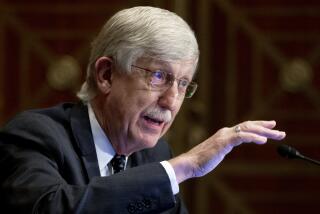New Office to Monitor Overseas Research
- Share via
WASHINGTON — A new office within the Department of Health and Human Services will oversee U.S.-funded medical research on foreign patients and address the ethical problems caused by experimenting on Third World populations, a top official said.
E. Greg Koski, director of the Office for Human Research Protections at HHS, said the international program will educate and assist U.S. scientists working offshore, particularly in developing nations, and monitor the effects of research on local populations.
“We want to make sure it is not exploitative, and we want to make sure it benefits them in an appropriate way--that it leaves something of value behind,” he said.
The new Office of International Activities will tackle issues raised in December in a Washington Post series, Koski said. The series documented risky and exploitative medical research that U.S. companies and institutions carried out in poor countries that had scant hope of benefiting from new drugs or medical breakthroughs. Although Koski has no authority over company-sponsored research, he enforces human subject protections in experiments funded with U.S. tax dollars.
The Post series described federally funded experiments on HIV-positive pregnant women in Thailand that withheld drugs known to stop transmission of the disease to the baby. Fifty-nine babies were born HIV positive. The series also reported on genetic research in a remote, impoverished region of China, carried out by Harvard University with millions of dollars of private and U.S. tax dollars.
Although Harvard officials say the China experiment was carried out responsibly, participants said government officials used “thought work” to pressure them into participating and promised medical care that never materialized.
Revelations about foreign medical experiments also have sparked bipartisan concern on Capitol Hill.
Rep. Sherrod Brown of Ohio, the senior Democrat on the House health subcommittee, called Tuesday for hearings into how to protect foreign test subjects and ensure that questionable results obtained overseas do not allow dangerous drugs to reach American medicine cabinets.
“It sort of shows how the drug companies disregard the ethics of what they do,” Brown said of the Post series. “The [Food and Drug Administration] probably needs more authority [to police foreign experiments] and probably needs more money to do this.”
Hearings also should explore how the World Health Organization could set oversight standards across national borders, he said.
At HHS, Koski also has suggested creation of specialized ethics panels to review research proposals for work in developing countries. The panels might include representatives of the international research community and host country, he said.
Under current rules, an institution must conduct its own ethics review before beginning any tax-supported human experiment here or abroad. Koski’s proposal would establish an independent body to provide additional review and input when the research involves vulnerable foreign populations.
The conduct of overseas medical tests also is under review by a presidentially appointed ethics commission.
For months, the National Bioethics Advisory Commission has been drafting ethical guidelines about appropriate research methods, patient protections and the obligations owed to countries that host clinical research.
More to Read
Sign up for Essential California
The most important California stories and recommendations in your inbox every morning.
You may occasionally receive promotional content from the Los Angeles Times.













